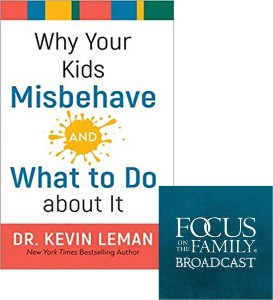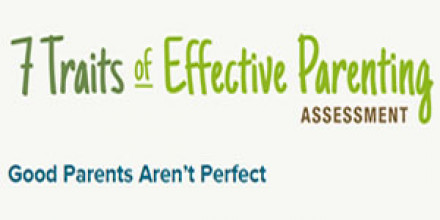
The War of Words
In this Adventures in Odyssey drama, a carelessly uttered word from Eugene creates havoc as it becomes the fashionable insult, resulting in a lesson about the power of words.
Home » Episodes » Focus on the Family Broadcast » Understanding the Root of Your Child’s Misbehavior (Part 2 of 2)
Preview:
Dr. Kevin Leman: When kids fight, they know exactly what to say to escalate the battle, and furthermore, they know how to engage you in the battle. You need to stay out of that battle. So, you don’t react, you respond, and you’re authentic, and you learn to say things like, “I’m sure you can handle it.” Turn your back and walk out of the room.
End of Preview
John Fuller: That’s really wise advice from Dr. Kevin Leman, and this is another Best of 2021 episode of Focus on the Family. Thanks for joining us. I’m John Fuller, along with your host, Focus president and author, Jim Daly.
Jim Daly: John, I’m excited to revisit part two of our encouraging conversation with Dr. Leman, and if you missed it, I’d encourage you to get the CD or the digital download. Uh, last time, we discovered how certain responses can actually encourage your children to misbehave.
John: Right.
Jim: And, if you’re like me, uh, when you hear Kevin’s common-sense advice, you wonder, why didn’t I think of that earlier? Uh, he has a great sense of humor and describes struggles every parent can relate to. Now, I know today’s program will encourage you.
John: Absolutely agree with you, Jim, and, uh, as a listener, get a copy of the conversation we began last time, and find out more about Dr. Leman’s book, Why Your Kids Misbehave: And What to Do About It. We’ve got all the details at focusonthefamily.com/broadcast. All right, let me just quickly add that, uh, Dr. Leman has been here numerous times. He is one of our most popular guests, and he’s a prolific author, a well-known psychologist, speaker, and TV personality, and he’s lots of fun, as Jim said. And let’s go ahead and revisit this Best of 2021 episode on today’s Focus on the Family.
Dr. Leman: We, we’re really getting to the crux of this book in our second broadcast, because this book really speaks to why kids misbehave. Well, why do kids misbehave? Number one, they’re attention getters. All kids are attention getters, you know. They come out of the womb, they’re completely dependent upon us, and as they grow into infancy toward that year old, you begin to see this little spirit. You just begin to see this little personality develop. I always tell mommies of young kids, when that child hits 18 months, circle the calendar, because you’re going to see a test of wills start about 18 months in a child’s life.
Jim: Well, and, and you elaborate on that, because you say both good behavior and bad behavior is both a, a yell for attention.
Dr. Leman: Absolutely. So, again, I go back to all kids are attention getters. Just follow me for a second. So, if the kid gets positive attention for positive behavior, they’re on a right track. As soon as they don’t get positive attention, they still need attention, so what kind of attention are they going to get? They’re going to get negative attention. And a kid tells himself, well, I’m still getting attention. It’s still working, but that runs its course. So, as the kid gets more discouraged in life, believe it or not, I’m saying a little ankle biter, 18 months to 3 years old, can get discouraged. Life isn’t working out the way they think, even at that age. They become powerful. So, why the attention getter says they only count life when I’m noticed, and I put people in my service, the powerful kid says, I only count life when I control, when I win, when I dominate. So, these are the kids who throw temper tantrums, and how we respond to those temper tantrums is really important, because that kid throws a temper tantrum for a purpose. Now, purpose is just a word. Purposeful is a psychological word that comes from the psychology of a guy named Alfred Adler. We won’t go into any detail there, but let’s just say that all social behavior serves a purpose in a kid’s life. So, the powerful child is saying, “I am in authority over you, parent.” There’s a guy named Saint Paul who said something very different. He said, “Children, obey your parents. It’s the right thing to do, because God has placed them in authority over you,” and I love that translation. That’s a living bible translation. That’s what I try to preach to parents. You need to be in authority without being the authoritarian to deal with this powerful child, because you need to remove your sails from that child’s wind, because if you don’t, and you come on with, “You can’t, I am your father,” or “I’m …” they’re going to blow you right against the wall.
John: Yeah.
Dr. Leman: In a power struggle, you lose, so you need to way, to develop ways of circumventing that powerful child where they realize that, wait a minute, these powerful ways aren’t working. These parents are a little smarter than what I’m giving them credit for.
John: Hm.
Jim: Well, and that’s the obvious question. Uh, when you have that confrontation, what should you do with that three-year-old?
John: Yeah.
Dr. Leman: Well, you know, the kid who’s going to throw the temper tantrum, you simply step over the child, walk away. If there’s no audience, that kid’s not going to [crosstalk]-
Jim: So, don’t give them the attention that they’re craving in that way.
Dr. Leman: Right, yeah. If you want to make a fool of yourself, honey, you go ahead. Uh, the point is, you’re going to separate the child. You pick up the child, remove them from the scene. That’s the principle I want to teach. And it just says, hey, it’s not going to work.
Jim: Yeah. Kevin, let me, uh, pick up on that, because in the book, you, you do describe parents’, uh, responsibility to make sure their child is getting enough of your time. That can be so difficult, and we can, as parents with busy schedules, we can justify all of our busyness, but you’re saying in the book, your child needs you, and needs you to spend time with them. So, sometimes this misbehavior is rooted just in they’re not getting enough of you.
Dr. Leman: Well, let’s start with this anti-American statement. Activities are not good for your children.
Jim: Now, let me ask Jean. Does that cut against the mom feeling of keeping the kids busy is a good thing?
Jean Daly: Yes. It does.
Dr. Leman: Busy hands are happy hands.
Jim: (laughs) And, I mean, I can remember-
Jean: It does.
Dr. Leman: Hey, it’s better than selling crack cocaine-
Jean: Well-
Dr. Leman: … on the street. I get it.
Jim: Right.
Jean: Well, and even, you know, I felt when our kids were young, I did not want them to spend too much time in sports, and I, I recognized that that wasn’t positive, and, and putting that pressure on them at such a young age. However, as they got older, I wasn’t sure that was the right decision.
Dr. Leman: Well, now we have team soccer. We have city soccer. The whole weekend is geared around the kids’ soccer, or softball, or whatever. I’m telling you, it’s crazy. Uh, kids, families don’t go to church on Sunday, because they’re off playing in a softball tournament. Uh, again, it’s all … So much is just directed toward the children. The children are the centerpiece. We bring up kids to feel like they’re the centerpiece of the world. I’ve said it many times, and I’ll say it again. If you do that, where is the room for almighty God in a kid’s life?
John: Hm.
Dr. Leman: And I’m here to answer my own question. There’s no room for God in that kid’s life, because you got them so busy, and you’re so busy. So, when we talk about time, where’s the time? The dinner table’s a great time to talk-
Jim: Yeah.
Dr. Leman: … but other than that, I mean, and I’ve heard on Focus on the Family studies from other authors who have said dads will spend 37 seconds a day talking to their kids, things like that. It’s outrageous. So, the mantra that imprinting, whatever you want to call it, in this book, I call it the three basic … There’s four, but the fourth one, you don’t see very often, so the other three, attention getting, power, and revenge are mostly the motivation behind the poor behavior, the maladaptive behavior that you see in your home with your children. But you need to understand that message that the kids are feeling like they need more parent, they need more love, they need more acceptance, and that’s, that’s the art of being a parent is making that kid feel special.
John: Hm.
Jim: No, that’s a good way to look at it, and that’s part of what you’ve included in your book there. Kevin, uh, you’re known as the birth order guy, and some people may not be familiar with that, believe it or not.
Dr. Leman: Really?
Jim: How many millions have you sold-
Jean: (laughs)
Jim: … of that book?
John: (laughs)
Dr. Leman: Many trees died in its honor.
John: (laughs)
Jim: (laughs)
Jean: (laughs)
Jim: A- and it’s a great concept. It’s one of those, you know, rare thoughts that you were able to grab and put into a book, The Birth Order book, but just lightly, tell us how that functions and how that helps to shape who we are. I’m sure we’re not locked into that, but you generally learn certain behavior patterns depending upon where you are in the pecking order, uh, of your birth, right?
Dr. Leman: Well, firstborns are the movers and shakers in our society. They’re our leaders, our political leaders. They’re our senators, our congresspeople. They’re our presidents of the United States. They’re our astronauts into outer space. If there’s something technical, the engineers, the accountants, you’re going to see an inordinate number of firstborn and only born children. They’re psychological cousins to each other. They do very well in life. The child right beneath them is at disadvantage. If that child’s a middle child, they’re going to end up a mediator, a negotiator, a compromiser. They’re going to be good at seeing life from both sides of the fence, which is pretty good. I love to tell middle children they’re the peanut butter and jelly of the sandwich. The babies of the family, if you name a comedian right now, in all probability, you’re talking about a baby of the family. Just name one. They’re babies, across the board. Very few exceptions. All the late-night TV guys, I don’t think they’re very funny, quite frankly, but they’re all youngest children.
Jim: Why is that? What, what, what action is in play there that makes them predominantly come from-
Dr. Leman: The achiever role was filled by you firstborn children, okay. The next child in line is the opposite of the, of that first born.
John: Hm.
Dr. Leman: So, there’s two roles, whatever they are. So, that baby of the family is, that humor guy, he can’t compete, and that was true in my life. I couldn’t compete with my-
Jim: (laughs)
Dr. Leman: … sister and brother, so I became the best of the worst. I graduated fourth in my class in high school from the bottom.
Jean: (laughs)
Dr. Leman: I mean, I was taking consumers mathematics, that’s bonehead math, as a senior in high school. I couldn’t get it in college. I finally did get in college on probation. I mean, most of you know my story. I mean, uh, it’s terrible. But, you know, along came this woman when I was 19 years old, after I was thrown out of college, and she was the one, my future wife, who I met in a men’s room of a hospital, believe it or not. She was the one that God used to turn my whole life around. And God gave me motivation. And I’m thankful for those years I struggled, but, um, we are a product of our environment, and you, as a parent, you’ve taken whatever you’ve gleaned from mom and dad into that role of parenthood. It can work for you, but it can also work against you.
Jim: So, what do we do, uh, knowing this and its predictability? Because that’s what’s genius about it. It’s, it’s generally true. It may not be absolutely true in every case, but I think you’ve done enough research and talked to enough people that you understand it the way you do. But, uh, how does a parent help augment that firstborn child to actually maybe not be as uptight, or rules oriented, etc. Is there, do you want to do that, or is this just the way God has planned it, and this is why kings and princes tend to be the firstborns, and leaders, as you said. Is it wrong to create a leader out of a last-born?
Dr. Leman: Well, I tried and failed to, with my firstborn daughter, I tried not to make her a firstborn. I’m here to tell you, I failed.
John: (laughs)
Jean: (laughs)
Dr. Leman: She is a firstborn. She was an English teacher. She knew what a dangling participle was.
Jim: So, high achiever.
Dr. Leman: Oh, yeah. Yeah. I mean-
Jim: So, do you just roll with it? I mean, is there a reason to, to, to, to try to augment that-
Dr. Leman: You know-
Jim: … or just let it go?
Dr. Leman: For all you firstborn and only born children listening to our broadcast today, you know that you might have a tad bit of perfectionism in your life. And perfectionism is slow suicide. That’s what you have to understand. And, I think the smart parent, when the kids are little, and you’re tucking them in, and this is the kid who’s got to line up everything, you know, everything’s got to be just sort of perfect. Um, kids love stories. Tell them stories. Make up stories. Embellish stories about your life. Share with them about the time you were embarrassed in school, about the time you got picked on, about the time you failed. Whatever it is, let the kid see the imperfect nature of you. I spoke in a church just three weeks ago, and I gave a talk on the title of my book, The Way of the Wise, which is Proverbs 3, verses one through six. I gave a very simple altar call about the imperfection of all of us. I had over a hundred people respond. I mean, I was sort of shaking my head. I, I was taken back by how many people responded to that. We’re all imperfect.
Jean: That’s right.
Dr. Leman: We need each other. Kids need to understand that we have their back. We love them with all their flaws. To our schoolteachers that I have some influence over, and we’re talking about a fourth-grade spelling test, why would you write minus four at the top of that? What’s wrong with plus 96?
Jean: Yes.
Dr. Leman: What’s wrong with looking for the positive ways of expressing, hey, good job. Good job is what I think I call Vitamin E. It’s encouragement.
Jean: Hm.
Dr. Leman: Not, we’re not praise. Praise God. All others pay cash, as someone once said. God’s worthy of our praise. Your kid isn’t, but your kid needs encouragement. Encouragement says, “I got your back. I see how you’re doing life. I’m proud to be your parent. You’re doing good, and if you get stuck, I’m here to help you. If that message comes across to your son or daughter, they’re going to go out in life, and they’re going to be a winner.”
Jean: And, Dr. Leman, isn’t it important with, let’s say, that firstborn, the high achiever, to, to acknowledge something other than just their performance? To acknowledge, to encourage something about them, their personality, their heart.
Dr. Leman: Oh, you’re the smart one around the table, Jean.
Jean: (laughs)
Jim: She is, actually. (laughs)
Dr. Leman: That, that’s, that’s the diamond answer, right there, because, as I’ve said to my kids, it, it’s not what you do. It’s who you are.
Jim: Mm-hmm.
Dr. Leman: And, uh, my little daughter, Lauren, was talking to a kid on the phone for about 30 minutes, and I asked her who that was. I said, “Gee, I haven’t heard that name. Is he a new kid?” “No, he’s just a kid nobody likes.” And I said, “What?” “It’s a kid at school nobody likes.” And she called him and talked to him about 30 minutes. And, this little daughter of mine, the youngest, she’s very sensitive to other kids, and she’s the one in, in the lunchroom at school would see somebody sitting by themself, and go over, and sit next to them.
Jean: That’s beautiful.
Dr. Leman: And, if, one thing I’m proud of, all my kids have a sensitivity to other people, and they’ve learned it. My wife is super wonderful human being, wouldn’t hurt a fly, would give you the shirt off her back. A lovely lady in every sense of the word. A much better person than I am. And I see those attributes that we have successfully passed along to our kids, and I think what I’m most proud of is that they care about other people. Wow. That’s pretty cool.
Jean: Hm. Yes.
Dr. Leman: I reminded yesterday when I talked to the Focus administrators about, you know, God hates the arrogant. He hates the proud. I think all of us have to do that homework to make sure that we understand that other people are important. We come to a stop sign or a red light, we stop. Why? It’s the law? Yeah. Get a ticket? Yeah. Get in an accident? The best reason why stop is so we don’t hurt somebody else, but notice, that’s not our first response.
Jean: Mm-hmm.
Jim: And those are heartfelt, good things about-
Dr. Leman: Yeah.
Jim: … parenting, and, and seeing your kids do the beautiful things, and you go, great, okay, they caught that lesson. And I think that happens as your ch- your children get older. You see more of that, um, hopefully. That’s the goal. Uh, in the book, you describe Discipline 101, and in there, you, you said, “Discipline goes hand in hand with misbehavior,” so, what’s the difference between discipline and punishment?
John: Mm-hmm.
Dr. Leman: Well, see, and this is sort of framed in our society today, because if you just come across as I’m punishing you, let me tell you how a kid thinks today. They don’t think of us on a different plane. They see themselves as social equals, so in their head, okay, if you have a right to punish me, I have a right to punish you back. And, discipline, I think, takes on a little different color that we acknowledge that mistakes were made. We turn things into teachable moments. I love to tell a story about … Our high school invited me to be on their wall of fame, and, and I jumped at the opportunity to do it, because I was such a little cut up in high school, but on the way up, I was talking to my mother, who was 90 years old, at the time. And I said, “Mom, we fooled a few people.”
Jean: (laughs)
Dr. Leman: You know, “Honey, I’m so proud of you.” And I reminded her about the time the police brought me home.
Jean: (laughs)
Dr. Leman: I’ll never forget what she said. She said, “Oh, I do remember that, but you were such a good boy.”
Jean: (laughs)
Jim: (laughs)
Dr. Leman: And so, somehow, we still have to come across with the fact that, you know, we love you anyway, and we accept you, flaws and all. So, discipline is, hey, you take the kid behind the closed door, and you have a little talk, and you give them the look, and they get the message that what happened at dinner or what happened at school was not cool at all, and my expectation for you is that we see a change in your behavior.
Jim: Hm.
Dr. Leman: It’s a teachable moment. And you ask the kid, what are you going to do to change that? We talked about rules afterward. All the Leman children wrote rules governing the use of the family car. I didn’t give them the rules. They wrote the rules. I didn’t ask them to write the rules. How’d that happen? They must have assumed that they realized it was a privilege to have that key to that car. You give a key to a car to a kid that’s not responsible, that’s on you. You’re a dummy parent. Don’t do that. Have expectations for your kids that are reasonable, not unreasonable.
Jim: Yeah, and what I continually hear from you, Kevin, is put that on your child to give you the boundaries. I mean, you’re pretty consistent with that.
Dr. Leman: Mm-hmm.
Jim: I like that idea, although it’s a nail biter for some parents-
Jean: Oh yes.
Jim: Especially firstborn parents.
John: (laughs)
Jean: Yes, but it, but it helped reinforce the goal, are you raising a child, or are you trying to raise an adult?
Dr. Leman: Again, that’s a gold star observation, but you know what? As you were speaking, I was thinking of my sister, Sally. I was speaking to a Christian education group in Grand Rapids, Michigan, in an auditorium of 6,000 people. I’ll never forget this moment, because we had breakfast together this, that day, and she was doing a workshop at the same event. And she says, “Kevin, what are you speaking about this morning?” It was an hour and five minutes away from the time. I said, “Well, I don’t know yet.”
Jean: (laughs)
John: (laughs)
Jim: (laughs)
Dr. Leman: And she looked at me, and her eyes narrowed. And you could see it. She said, “Well, you must know what you’re going to be speaking about. You’re going to be speaking in 55 minutes.” I said, “Well, when I look at them, I’ll decide.”
Jim: Hm.
Dr. Leman: And, she said, and she said, “You are making my stomach turn.”
John: (laughs)
Jim: (laughs)
Jean: (laughs)
Jim: We’ve never had that discussion, have we, Jean?
Jean: Yes.
Dr. Leman: And what you have to understand is-
Jean: Yes.
Dr. Leman: … that the Jean’s in life, if she’s going to speak to a woman’s group, that sucker is going to be organized. She’s going to have her PowerPoints.
Jean: Oh, yes.
Dr. Leman: It’s going to be lockstep.
Jean: Oh, yes.
Dr. Leman: And yet, and yet, if Jim was going to speak, uh-
Jim: It’s the same thing as you. (laughs)
Jean: (laughs)
Dr. Leman: He’d, he’d show up and say, “Well, it’s great to be here at the rotary club,” and say, “Actually, it’s not the rotary club. It’s the Christians of, uh …” “Oh, excuse me, yes, but here’s the …” You know, he’s, he’s like I am-
Jean: Yes.
Dr. Leman: He’s just going to go in there and do it.
John: Yeah.
Jean: And he’s a much better speaker than I am.
Jim: Ke- Well, that’s generous. Kevin, let me ask you this.
Dr. Leman: Yeah.
Jim: Uh, parents, we can emotionally overreact, obviously.
John: Hm.
Jim: And I think it’s really critical, as we wind down the time, we’re going to take some questions in a minute, but, uh, one of the things that we trip on as parents is that we can get sucked into the emotional argument, and we end up, I mean, I did this with the boys when they were younger. I mean, I’d get right down at their level, emotionally. I’m going, oh my goodness, who’s the adult in the room?
John: (laughs)
Dr. Leman: Yeah.
Jim: You know? And I, I, the question I have for you is just, how do we as the parent remember we’re the parent, and don’t be tricked, getting into that game with your kid?
John: Don’t take the bait.
Jim: Don’t take the bait.
Dr. Leman: Well, don’t take the bait. Well, remember, fighting’s an act of cooperation. When you fight with your husband or your wife, you know exactly what to say to escalate the battle, okay. Same thing is true of kids. When kids fight, they know exactly what to say to escalate the battle, and furthermore, they know how to engage you in the battle. You need to stay out of that battle. So, you don’t react. You respond. And y- and you’re authentic, and you learn to say things like, “I’m sure you can handle it.” Turn your back and walk out of the room. If you see blood 20 minutes later, I’d get involved.
John: (laughs)
Dr. Leman: But, let the kids have a track record, so to speak-
John: Yeah.
Dr. Leman: … in their own home that they’re going to solve their own problems. And so, I would say, don’t panic. Don’t overreact. Be a listener and listen again. If you can listen without judgment, if you remember this, judgments will separate you from your child. Judgments will separate you from your husband or your wife.
Jim: What’s a judgment sound like?
Dr. Leman: You’re wrong.
Jim: Oh, yeah.
Dr. Leman: Being prescriptive.
Jim: Yeah.
Dr. Leman: You know, where-
John: You should have done, that kind of thing.
Dr. Leman: Yeah, yeah. Any, any t- thing along that line. So, if you learn to listen without judgment, okay, just hear them out. Lots of times, the situation will calm down by itself. So, we make things worse. It’s like we throw kerosene on the fire. It just flames up.
John: Yeah.
Dr. Leman: But just remember, fighting’s an act of cooperation. And, some people are listening right now and saying, “Boy, my kids sure cooperate.”
Jean: (laughs). Right.
Dr. Leman: Because they fight over everything.
Jim: Right.
Dr. Leman: Well, if you have a trouble getting a kid out the door to school, and maybe you’re in a carpool. In fact, I have that example in this book. Do you want that to change? I can tell you how to change. It’ll change in one day. Leave your 11-year-old home. Don’t call them. Don’t get them up in the morning. Take the other kids to school. He’ll be waiting there in the carport. He’ll be out in front of the house. He’ll be mad. He’ll be angry he’s late for school. Honey, we’ve had this talk so many times. I’m not your alarm clock anymore. From now on, you’re either up, you’re on the train, or you’re not, and I’m not real happy, because now I have to drive you back to school. But be smart. Send an email or call the principal. Have them call that kid in and talk with them about being late. It works beautifully. Action, not words.
John: Hm.
Dr. Leman: You’ve already used words. You use them every day, over, and over, and over again. It hasn’t got you the results. You want the kid to be up in the morning and on the school bus? Use action, not words. That’s why the little Why Kids Misbehave is such a good, practical book, because the back part of it is what to do about it, and those are some of the things you do about it.
Jim: Yeah, and you have a whole host of time-tested strategies in there, Kevin, and it’s a great resource, but let’s open it up now. Let’s have a couple of questions from our guests here today, and, and see if they can stump the expert.
John: (laughs)
Evan: Hi, Dr. Leman. My name is Evan. Uh, you talked about the importance of training children, and like with a puppy, starting when they’re young. For those of us who may not have done well at that when they’re young, uh, is there hope for us, and how might we, say, with elementary school children, um, start to be more intentional about that training, uh, without causing a shock to the family?
Jim: (laughs)
Dr. Leman: Well, I love your question, Evan, but, you know, I think one of the real joys of parenting sometimes is blindsiding those little suckers.
John: (laughs)
Audience: (laughs)
Jim: It’s a spiritual truth, right?
Jean: (laughs)
Dr. Leman: It really gets their attention. And see, you have the heart of a parent. You’re saying, “Hey, Leman.” Okay, I’m with you. I understand, you know, maybe you got a kid still sleeping in your bed, for example, and Dr. Leman says, “Don’t start habits you don’t want to have continue forever, so get that little sucker out of bed,” and you’re saying, “Well, I’m looking at my life, and, you know, there’s some things that we need to change, but how can I change them without being injurious to little Buford?”
Jean: (laughs)
Dr. Leman: And, I’m saying, “No, Evan, let’s try it a different way. Let’s blindside that little sucker, Evan.”
Jim: (laughs)
Dr. Leman: And really get his attention. And then say, “You know something? Mommy and daddy have done some real heart searching, and we think that things have to change here in the family. And you’re going to see some changes in us that you’re probably not going to like, because we’re all creatures of habit. We’ve all learned to do things a certain way, but there’s some things happening soon. You’re going to see that, and you’re going to have to deal with it as best you can.”
Jim: That’s good.
Dr. Leman: Now, I prefer that over trying to make this a soft, easy transformation into a new world for that son or daughter.
John: Hm. Isn’t that great advice from Dr. Kevin Leman? Uh, we’re concluding our two-day conversation with him, um, talking primarily about his book, Why Your Kids Misbehave: And What to Do About It. We highly recommend that book. Uh, it’s a wonderful resource. We’re making that available today if you can make a donation of any amount to the work of Focus on the Family. It’s our way of saying thank you for joining the support team and enabling us to do ministry literally around the world. Donate and get your copy when you call 800, the letter A, and the word FAMILY, 800-232-6459, or you can donate and get the book at focusonthefamily.com/broadcast.
Jim: And, let me encourage those who can, uh, please, help us share the hope of Jesus Christ this Christmas. Thousands of people will reach out to Focus on the Family for help in this coming year. Even more will hear our radio programs and our podcasts. We rely on your partnership to share the good news of Christ with millions of listeners, including many who flip to our radio program by happenstance and hear the gospel for the first time. So, please, join us in ministry. Be generous with your gift to Focus on the Family today.
John: We look forward to hearing from you, and, uh, once again, the number to call is 800, the letter A, and the word FAMILY, or you can donate online at focusonthefamily.com/broadcast. And, coming up next time on yet another Best of 2021 broadcast, the powerful story of Dr. Patti Giebink a former abortion doctor who became an advocate for life.
Preview:
Patti Giebink: And, I just intensively was studying the Bible with direction, and understanding it, and at some point, and I, I don’t exactly know when, but it became so clear to me that, that God is the god of life. That’s his character. That’s his heart. There should be no question.
End of Preview

Jean Daly is a wife, mother, and an advocate for children in foster care. She is a volunteer for Maple Star Colorado, an independent, non-profit organization providing foster care, clinical, and community support systems. Jean and her husband Jim have shared their home with foster children – both short and long term – since 2011. Jean also gives her time to the Flying Horse Foundation, helping provide Equine-Assisted Learning for children who have experienced trauma. She is very active in a local church, and also enjoys hiking, glamping, and life with their two young-adult sons.

Receive the Why Your Kids Misbehave, and What To Do About It resource bundle for your donation of any amount! And when you give today, your support will be DOUBLED to Give Families Hope!

Award-winning artist Morgan Weistling beautifully captures the magic of family this holiday season in a 16" x 20" special edition giclée print called "Family Traditions."

There's no parenting formula to follow, but there are ways you can grow every day. This assessment gives parents an honest look at their unique strengths, plus some areas that could use a little help.

Dr. Leman offers advice to parents who are tired of always saying ‘no,’ to TV shows and video games.

Dr. Kevin Leman debunks the myth that a parent's job is to make their child happy.

This clever discipline method is less exhausting and more successful than ranting, raving, blaming, pleading, begging or threatening.

Learn what to do as a parent when your kids act irresponsibly.

In this Adventures in Odyssey drama, a carelessly uttered word from Eugene creates havoc as it becomes the fashionable insult, resulting in a lesson about the power of words.

This discussion offers a preview of Volume #16 “Cultures in Conflict” from the That The World May Know video series, available below.

Debra Fileta will help couples better understand the four seasons of healthy relationships, what to expect during each one, and how to carefully navigate them for a stronger marriage. (Part 1 of 2)

Larnelle Harris shares stories about how God redeemed the dysfunctional past of his parents, the many African-American teachers who sacrificed their time and energy to give young men like himself a better future, and how his faithfulness to godly principles gave him greater opportunities and career success than anything else.

Amy Carroll shares how her perfectionism led to her being discontent in her marriage for over a decade, how she learned to find value in who Christ is, not in what she does, and practical ways everyone can accept the messiness of marriage and of life.

Psychologist Dr. Kelly Flanagan discusses the origins of shame, the search for self-worth in all the wrong places, and the importance of extending grace to ourselves. He also explains how parents can help their kids find their own sense of self-worth, belonging and purpose.